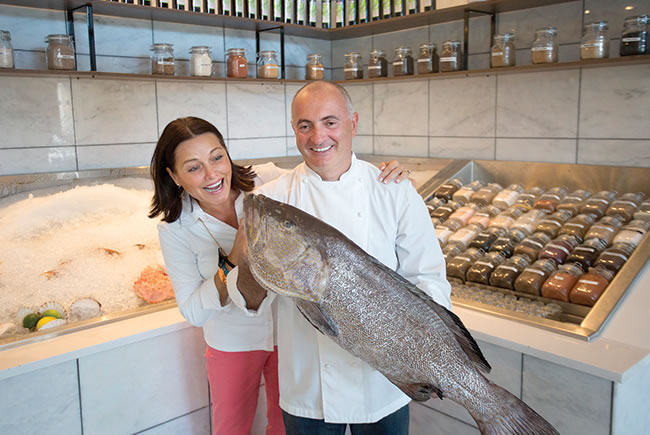Florida's Best Places to Dine - The Present
Posted 11/27/2017

Fifty years is a long journey, yet Floridians ate quite well with our Golden Spoons and sometimes our fingers.
We learned to eat sushi, tapas, kebabs, hummus, calamari, spaghetti carbonara, wraps, yogurt, chocolate bacon, chicken vindaloo, tofu, smoothies and frappuccinos.
We aped New American cuisine that was largely from California; imported Old World ham and Thai chilies; and discovered our own rock shrimp.
Enter Pork Belly
Today, our menuscape and dining habits are vastly different.
Now we eat pork belly and octopus. Chefs are celebrities, and bartenders are artisans. We dine in bakeries and sup on bar food.
Back in our first Golden Spoon review, a few readers commented that restaurants needed more local products.
Today, Floridians demand local, local, local in all ingredients even if our climate and its agriculture is unfriendly to olives, salmon, artichokes, lamb, Cabernet Sauvignon and great cheeses.
Yet a small renaissance of Florida farms is growing more tropical and citrus fruits and better tomatoes, from grape-sized sweets to big UglyRipe. Specialty growers produce big crops of arugula and watercress.
Florida ranchers raise more heirloom breeds and grass-fed beef. Florida hauls in groupers, snappers and tilefish, while aquaculture crews harvest caviar and clams.
The energy and dreams of food entrepreneurs and farmers are bursting their garages, yards and market stands with pickles, mustards, jams, herbs, coffees, candies, muffins and salsas made close to home. More than 100 craft breweries, a score of distillers and as many wineries slake the thirst for local. Independent bakers are far more numerous and supply a world of ancient breadstuffs, from lavash and tortillas to Cuban bread and croissants and crusty artisan loaves.
Florida A.D. (After Disney)
Walt Disney arrived, and in his wake, a world of chefs, sous chefs and tourists followed, making Orlando a culinary destination. In Miami, South Beach was reborn, and the Mango Gang of chefs stirred up a Floribbean mix of New World flavors that had the nation’s foodies raving in the 1990s. Immigrant cooks did the same with less attention.
We worried about fat, salt, cholesterol, carbohydrates, gluten and lactose intolerance. Growing numbers of Floridians avoid animal products, processed food and even anything cooked.
Generations of diners (and future chefs) watched Julia Child until the Food Network and the “Iron Chef” conquered much of our television, movie and cell phone screens. We took our food obsessions online in endless chats and blogs.
Whole Foods, Fresh Market and Publix Greenwise took grocery shopping upmarket. Amazon and online deliveries brought food, beer and wine to our doors.
In 1968, enterprising restaurateurs started a seafood house in Lakeland called Red Lobster that created big-name brands that spread across the country. Two decades later, a Tampa group did the same with a steakhouse called Outback.
Small is Beautiful
Increasingly, we eat imaginative, hand-crafted food served very casually. Tapas, the little dishes of Spain, are now the small plates from everywhere: Fritto misto and mee krob to fried chicken, biscuits and deviled eggs.
Floridians now eat casually, too, in market halls and fairs, at food trucks and in restaurants reclaimed from warehouses, where the only polish is on the concrete floor and the neighborhood isn’t among the silk-stocking precincts.
The money and the smarts are in the kitchen, and more talent is on the way. Florida cooking schools at the high school and college level are booming, and the number of self-taught food wizards may be greater.
Best of all, the current generation of chefs and cooks has set up shop almost everywhere, from Port St. Joe to Sanford to Cape Coral and Vero Beach.
What to call such cuisine carefully made from one part each, global peasant pub grub, Southern farmhouse and retro diner? Is it New American, contemporary, farm-to-table, eclectic? None truly fit, yet all do.
If anything, chefs and diners are trying to capture the old-fashioned era of hand-crafted food and drink.
Or not. Modern life in 2017 also allows cook-in-bag meals, take-out of every flavor and groceries delivered into your fridge and kitchen cabinets.
As Americans turned away from Bud and imported beer, Florida offered up Cigar City Jai Alai.
